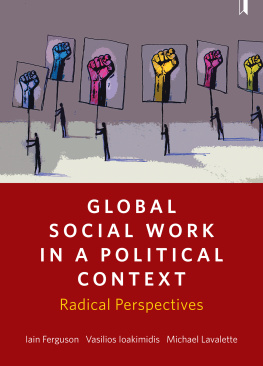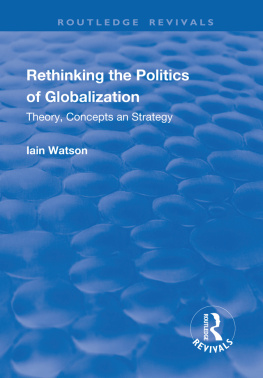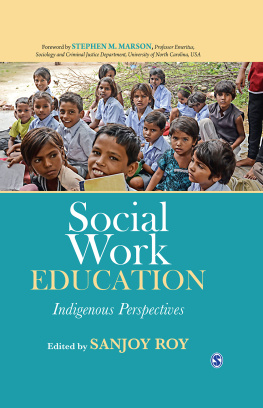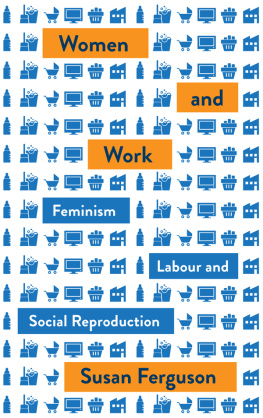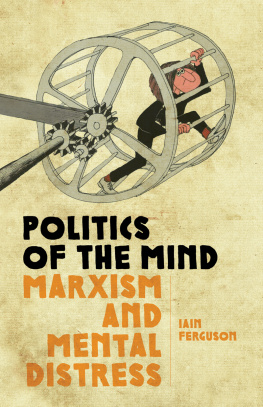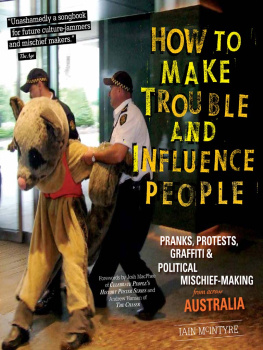Iain Ferguson Vasilios Ioakimidis - Global Social Work in a Political Context: Radical Perspectives
Here you can read online Iain Ferguson Vasilios Ioakimidis - Global Social Work in a Political Context: Radical Perspectives full text of the book (entire story) in english for free. Download pdf and epub, get meaning, cover and reviews about this ebook. year: 2018, publisher: Policy Press, genre: Politics. Description of the work, (preface) as well as reviews are available. Best literature library LitArk.com created for fans of good reading and offers a wide selection of genres:
Romance novel
Science fiction
Adventure
Detective
Science
History
Home and family
Prose
Art
Politics
Computer
Non-fiction
Religion
Business
Children
Humor
Choose a favorite category and find really read worthwhile books. Enjoy immersion in the world of imagination, feel the emotions of the characters or learn something new for yourself, make an fascinating discovery.
- Book:Global Social Work in a Political Context: Radical Perspectives
- Author:
- Publisher:Policy Press
- Genre:
- Year:2018
- Rating:4 / 5
- Favourites:Add to favourites
- Your mark:
- 80
- 1
- 2
- 3
- 4
- 5
Global Social Work in a Political Context: Radical Perspectives: summary, description and annotation
We offer to read an annotation, description, summary or preface (depends on what the author of the book "Global Social Work in a Political Context: Radical Perspectives" wrote himself). If you haven't found the necessary information about the book — write in the comments, we will try to find it.
Global Social Work in a Political Context: Radical Perspectives — read online for free the complete book (whole text) full work
Below is the text of the book, divided by pages. System saving the place of the last page read, allows you to conveniently read the book "Global Social Work in a Political Context: Radical Perspectives" online for free, without having to search again every time where you left off. Put a bookmark, and you can go to the page where you finished reading at any time.
Font size:
Interval:
Bookmark:


First published in Great Britain in 2018 by
Policy Press University of Bristol 1-9 Old Park Hill Bristol BS2 8BB UK Tel +44 (0)117 954 5940 e-mail
North American office: Policy Press c/o The University of Chicago Press 1427 East 60th Street Chicago, IL 60637, USA t: +1 773 702 7700 f: +1 773-702-9756 e:
Policy Press 2018
British Library Cataloguing in Publication Data
A catalogue record for this book is available from the British Library
Library of Congress Cataloging-in-Publication Data
A catalog record for this book has been requested
ISBN978-1-4473-2267-2 paperback
ISBN 978-1-4473-2266-5 hardcover
ISBN 978-1-4473-2269-6 ePub
ISBN 978-1-4473-2270-2 Mobi
ISBN 978-1-4473-2268-9 ePdf
The right of Iain Ferguson, Vasilios Ioakimidis and Michael Lavalette to be identified as authors of this work has been asserted by them in accordance with the Copyright, Designs and Patents Act 1988.
All rights reserved: no part of this publication may be reproduced, stored in a retrieval system, or transmitted in any form or by any means, electronic, mechanical, photocopying, recording, or otherwise without the prior permission of Policy Press.
The statements and opinions contained within this publication are solely those of the author and not of the University of Bristol or Policy Press. The University of Bristol and Policy Press disclaim responsibility for any injury to persons or property resulting from any material published in this publication.
Policy Press works to counter discrimination on grounds of gender, race, disability, age and sexuality.
Cover design by Andrew Corbett
Front cover image: www.alamy.com
Readers Guide
This book has been optimised for PDA.
Tables may have been presented to accommodate this devices limitations.
Image presentation is limited by this devices limitations.
This book draws on our work with colleagues in a variety of radical social work networks across the global social work community. It would be impossible to thank them all individually, but we would like to acknowledge the support, friendship and comradeship of colleagues in the range of radical social work groups across the globe. These include the Social Work Action Network (SWAN) groups in Ireland, Greece, Canada and Britain. Similar groups in other global locations include the Boston Liberation Health Group, the New Approach Group in Hungary, the Progressive Welfare Network, Hong Kong, the Rebel Social Work Group in New Zealand/Aotearoa and the Arbeitskreis Kritische Soziale Arbeit (Critical and Radical Social Work Network) in Germany. We would also like to acknowledge the many inspiring representatives that we have met from the social work associations in Spain, Argentina and Brazil. In particular, we remember fondly the meeting we coordinated at the Global Social Work conference in Sweden to try and establish an international network together; the meeting was well attended and just about to start when the Brazilian colleagues arrived. Their presence was remarkable for two reasons: first, there were lots of them! Second, they all wanted to debate with us on the continuing relevance of Marxism to social work not something we experience very often!
Our experience in social work has also been enhanced by the involvement of a range of service users and service-user organisations and colleagues in relevant campaigning organisations. Among the many organisations that we have worked with, we would like to thank Disabled People Against the Cuts, Recovery in the Bin, Black Triangle, Shaping Our Lives and Stand Up To Racism. In Britain, many social workers are active within both social work and their union. Helen Davies, Sharon Campion, Simon Cardy, Malcolm Jones, Bea Kay and Jimmie Main are active Unison members (and SWAN supporters) who regularly provide us with insights on working life on the social work front line.
As well as organisations, we would like to thank a number of colleagues who we have worked with in radical social work over the years: from the global community, the list includes Bessa Whitmore, Michael Reisch, Elaine Behring, Catherine MacDonald, Suzanne Dudziak, Jelka Zorn, Silvana Martinez, Fumihito Ito, Lcia Garcia, Paul Michael Garrett, Dawn Belkin Martinez and Roberta Uchoa. Closer to home, we would like to thank Rich Moth, Linda Smith, Joe Greener, Rea Maglajlic, John Harris, Terry Murphy, Jeremy Weinstein, Natalie Farmer, Barrie Levine, Victoria Jupp-Kena, Lee Humber, Peter Beresford, Katherine MacKay, Des McDermott, Mark Baldwin, Chris Jones, Gurnam Singh, Maria-Inez Martinez, Alissa Ruane, Bob Williams-Finlay and the sadly missed Rona Woodward. Three people who deserve special mention for their inspiration and continuing commitment to radical social work theory and practice are Dora Teloni in Greece, Kerry Cuskelly in Ireland and Lam Chi Leung in Hong Kong each represents everything that is good about radical social work and they have our utmost admiration for all they do!
We want to thank Policy Press for their continuing support of both the journal Critical and Radical Social Work (CRSW) and their commitment to publish radical social work texts. Thanks in particular to Julia Mortimer, Rebecca Tomlinson, Edwina Thorn, Catherine Grey and Isobel Bainton. We are grateful to Policy Press and CRSW for allowing us to use some material in Chapter Nine that originally appeared as an article by Vasilios, entitled Beyond the dichotomies of cultural and political relativism: arguing the case for a social justice-based global social work definition, Critical and Radical Social Work , 1(2): 183200.
Finally, writing a book and taking part in various social movement activities takes time and can only be accomplished with the continuing support and co-participation of our partners. So we would like to record our thanks to Dorte Pape, Natalia Barrera Villota and Laura Penketh.
IF, VI, ML
As we approach the end of the second decade of the 21st century, the world is facing a growing number of, seemingly intractable, problems. Where does social work sit in relation to these problems and how should social work respond? Let us map out the terrain upon which these problems rest.
What Michael Roberts (2016) calls the long depression shows no signs of ending. Financial instability and low economic growth continue to have an impact on global economic performance. In response to this crisis, large units of capital and states across the globe have been involved in a concerted attempt to reduce living standards, for the majority, as a means of restoring profitability across the system. This has been enshrined in policies of austerity, the claim that we can no longer afford what is thought of as the post-war welfare settlement and that, as a result, there is no alternative to savage cuts and welfare restructuring.
The attempt to transform the welfare state (in all their variety across the globe) is important for social work. It has a significant impact on those who social work services work with (who find their services cut and stigmatised). For front-line practitioners, it means fewer resources to support service users, but it has also been matched by attempts to restructure and narrow the social work task. How do we understand these processes and, as social workers, how do we respond?
The 10-year depression and austerity politics have also had the effect of eroding public confidence in mainstream politicians and state actors. This has been particularly acute with regard to the crisis of social democracy, which increasingly looks like a universal phenomenon. The politicians of the centre, across the globe, act as if little has changed. For those of the social-democratic Left, this means that they have continued to promote the (failed) policies of the first decade of the century promoting globalisation, trade liberalisation and the marketisation of public services. However, these politicians are uncomprehending of the rejection of their politics as populist movements (of both the Left and Right) grow to challenge the political centre. Over the last few years, we have witnessed new social movements challenging the power of the powerful but we have also seen the growth of right-wing political networks that promote economic and political nationalism, xenophobia, and racism (with particular hostility towards migrants and refugees). These developments present huge challenges for social work and, once more, raise questions about how we respond.
Font size:
Interval:
Bookmark:
Similar books «Global Social Work in a Political Context: Radical Perspectives»
Look at similar books to Global Social Work in a Political Context: Radical Perspectives. We have selected literature similar in name and meaning in the hope of providing readers with more options to find new, interesting, not yet read works.
Discussion, reviews of the book Global Social Work in a Political Context: Radical Perspectives and just readers' own opinions. Leave your comments, write what you think about the work, its meaning or the main characters. Specify what exactly you liked and what you didn't like, and why you think so.

